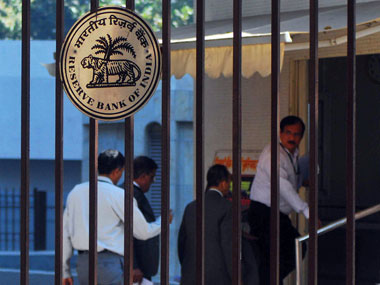The Reserve Bank of India has not intervened in a big way in the currency markets, unlike most of its emerging Asian peers, because it can ill-afford to expend a limited and fragile holding of foreign exchange reserves, RBI sources say.
That reluctance to intervene is just one of the factors that sets the RBI apart. It also is currently the most hawkish in the region, waging an expensive and tough war against inflation, while most of the world frets about slowing US growth and a European debt crisis.
A persistent current account deficit and realisation that an uncertain global environment is bound to keep markets volatile are reasons the RBI is loath to intervene in a big way, spending its small pool of dollar reserves, sources with direct knowledge of the matter told Reuters.
[caption id=“attachment_90636” align=“alignleft” width=“380” caption=“The RBI was last a net seller of dollars in April 2009, when the Lehman crisis weakened the rupee, and any intervention since then has always been aimed at checking a rise in the local unit.Reuters”]  [/caption]
While many Asian central banks including South Korea, Indonesia and Philippines have been spotted selling dollars to protect their currencies, the RBI has put up only a token show, with some minor intervention in recent weeks.
India’s partially convertible rupee has been the worst performer among major Asian currencies -so far in 2011, losing nearly 12 percent of its value since touching its 2011 high of 43.855 against the dollar on July 27.
“Intervention depends upon the pace of volatility. But the threshold for volatility also changes with the situation,” an official familiar with the matter told Reuters.
“Look at how the euro has been behaving, how gold, US Treasuries have been moving. If all asset classes are so volatile, then the tolerance level will also rise.”
The rupee has weakened nearly 7.2 percent against the dollar since late August, on heightened concerns over European sovereign debt and a likely Greece default. The euro has fallen on most days since August 29, 7.3 percent down in the period and touched a seven-month low of $1.3499 on Sept. 12.
In the same period, the key Asian currencies -Korean won, Indonesian rupiah, Philippine peso have fallen between 1 percent and 10 percent.
UNDERVALUED
The RBI’s modest approach would be understandable if they were keeping the rupee stable in trade-weighted terms, but that is not the case. The rupee has been increasingly undervalued in nominal trade-weighted terms.
However, this approach is not new. Its forex policy has by definition been hands off.
Asia’s third largest economy has reserves that are merely a tenth of the size of mighty neighbour China’s. Because India runs a trade deficit, the reserves also comprise a pool of borrowed money that can dwindle quickly should foreigners pull short-term investments away from the country.
Still, many traders and economists are now questioning the wisdom of sticking to that practice amid high inflation, a large trade deficit and heightened uncertainty across currency markets.
“Downside pressure remains strong, and one-off intervention may not be enough in an environment of growing contagion risks. This begs the question of whether an increase in the frequency and magnitude of RBI intervention is likely,” Standard Chartered said in a report.
The RBI was last a net seller of dollars in April 2009, when the Lehman crisis weakened the rupee, and any intervention since then has always been aimed at checking a rise in the local unit.
But the biggest impediment to dollar sales is the country’s current account deficit , a stark contrast with its Asian peers such as Indonesia, South Korea and Taiwan, all of whom are running current account surpluses.
“There is an asymmetry when a central bank buys dollars to intervene and when it sells dollars to intervene,” the official familiar with the matter said.
“When you are selling dollars, you are losing the country’s FX reserves, which is not a very comfortable thought given that we are a current account deficit country.”
In the face of foreign fund outflows and India’s trade deficit, the RBI’s absence from the FX market has only fuelled investor pessimism towards the rupee, the Standard Chartered economists noted.
India’s current account deficit in January-March narrowed to $5.4 billion from $12.8 billion deficit a year earlier, but the global slowdown could hurt exports, widening the deficit again.
A wider current account deficit would put pressure on the country’s ability to buy oil which is by far the largest component in India’s import bill.
INFLATION AND INTERVENTION
Though the RBI maintains that it will never use the foreign exchange rate to contain inflation, selling dollars to arrest the rupee’s current sharp drop has the added attraction of helping to ease imported inflation.
India’s big state oil companies last week raised the price of petrol by nearly 5 percent.
“Yes, the petrol prices were raised because of the rupee depreciation and not due to any rise in global oil prices and that will have an impact on inflation,” said another official senior official, directly involved in the matter.
“But any impact on inflation due to intervention will be incidental and not our objective,” the official added.
India’s inflation has stayed over 9 percent for the last four months and persistently above the central bank’s comfort zone of 4.0-4.5 percent despite the RBI’s aggressive 18-month rate tightening cycle.
“It is a sentiment spiral that started in August and I don’t think the rupee will turn around unless there is some positive development globally,” he added.
Reuters


)
)
)
)
)
)
)
)
)



